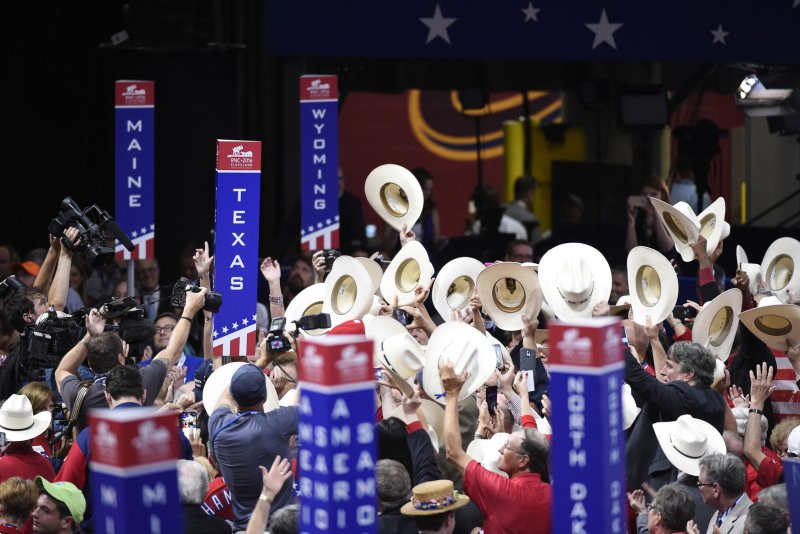Texas delegates, center, hold stetsons in the air and celebrate as they cast their state's votes for GOP nominee Donald Trump on day two of the Republican National Convention at Quicken Loans Arena in Cleveland, Ohio, on Tuesday. On Wednesday, a federal appeals court ordered that the state of Texas must fix a voter ID registration law enacted three years ago that most of the panel's judges concluded is discriminatory against minority residents and impacts more than 600,000 potential voters. Photo by Pete Marovich/UPI |
License Photo
NEW ORLEANS, July 20 (UPI) -- With less than 16 weeks to go until November's general election, a federal appeals court ruled Wednesday that the state of Texas needs to fix its strict voter identification law because it unlawfully discriminates against minorities.
The Fifth U.S. Circuit Court of Appeals said in its ruling Wednesday that the Texas law, passed in 2011 and enacted in 2013, does not treat all residents in an equal fashion in mandating they furnish one of a number of acceptable forms of I.D. to register to vote.
The problem, opponents and a lower court have concluded, is that it's difficult or impossible for more than 600,000 Texas residents, disproportionately minority, to obtain one of those forms of ID to vote.
Wednesday, nine of the court's 15 judges agreed with the assertion that the law, known as S.B. 14, is discriminatory -- mostly agreeing with the lower district court's ruling that the potential voters who are most affected by the law are African Americans, Hispanics and the poor.
"We affirm the district court's finding that S.B. 14 violates Section 2 of the Voting Rights Act through its discriminatory effects," the appellate court said in its decision.
Opponents to the law have tried to take the issue all the way to the U.S. Supreme Court, and the high court gave the New Orleans-based Fifth District appellate court until Wednesday to make a ruling on it.
The court beat the deadline but, however, offered no solution -- sending it back to the district court for a fix.
"The district court must ensure that any remedy enacted ameliorates SB 14's discriminatory effect, while respecting the Legislature's stated objective to safeguard the integrity of elections by requiring more secure forms of voter identification," the court stated.
Rep. Marc Veasey/Twitter
"Today Texas voters' fair access to the ballot box is restored," Rep. Marc Veasey, D-Texas, the lead plaintiff in the suit, said Wednesday. "The full U.S. Court of Appeals for the Fifth Circuit ruled on the right side of history. They found what many of us already knew to be true: Texas' restrictive photo voter ID law discriminates against minority voters and disenfranchises eligible American voters."
Texas' voter ID registration law is considered to be among the strictest in the United States. It was passed by lawmakers to make it difficult for ineligible residents to cast ballots in state races and on political matters.
"The decision affirms our position that Texas's highly restrictive voter ID law abridges the right to vote on account of race or color," U.S. Attorney General Loretta E. Lynch said in her response.
Texas Attorney General Ken Paxton responded to the court ruling Wednesday with disappointment.
"Preventing voter fraud is essential to accurately reflecting the will of Texas voters during elections, and it is unfortunate that this common-sense law ... was not upheld in its entirety," he said in a statement.
"It is imperative that the State government safeguards our elections and ensures the integrity of our democratic process," he added.
Many other leaders also felt that Wednesday's ruling was a vote against electoral integrity.
"Voter fraud is real, and it undermines the integrity of the election process," Texas Gov. Greg Abbott said in a written statement. "Texas will continue to make sure there is no illegal voting at the ballot box."
The state of Texas could appeal the court's ruling before the Supreme Court -- but it's unclear whether that will happen before November's election. The high court remains at eight members and most experts believe it would be split evenly on this issue, 4-4, until a replacement for the late Antonin Scalia is confirmed.
Veasey v. Texas















